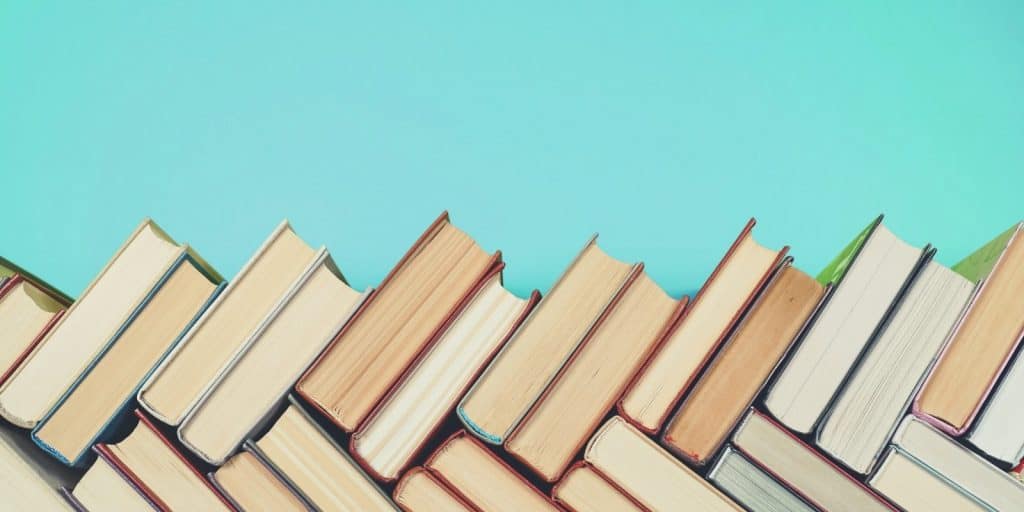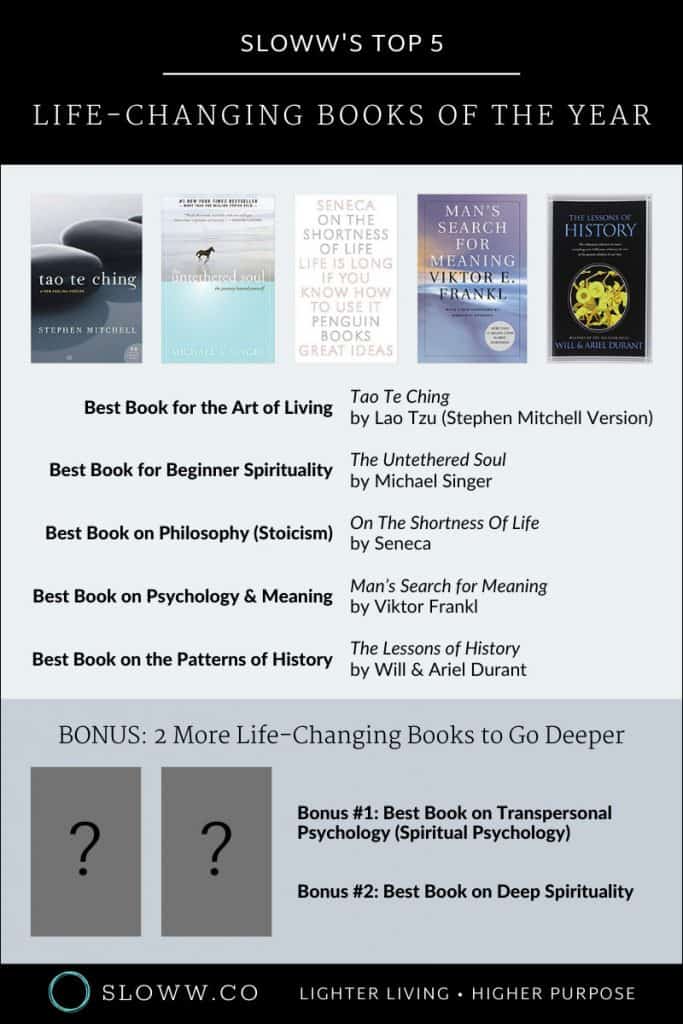Last year, I published The Top 3 Life-Changing Books I Read in 2018 (& Worth Your Time in 2019).
The top 3 (in no particular order) included:
- Voluntary Simplicity: Toward a Way of Life That Is Outwardly Simple, Inwardly Rich by Duane Elgin (Summary | Amazon)
- A New Earth: Awakening to Your Life’s Purpose by Eckhart Tolle (Summary | Amazon)
- Essentialism: The Disciplined Pursuit of Less by Greg McKeown (Summary | Amazon)
This year, I became much more intentional about my reading and created a reading list.
I started asking myself:
- What books should I really read?
- What are the must reads?
- In what order?
- And, equally important, what books should I skip (at least for now)?
After all, we don’t know how much time we’ll have here, so:
“Read the best books first, or you may not have a chance to read them at all.” — Thoreau
This perspective and intentionality really changed reading for me. I ended up reading a nice mix of timeless and modern books this year like:
- The Alchemist by Paulo Coelho (Summary | Amazon)
- Meditations by Marcus Aurelius (Summary 1, 2 | Amazon)
- Enchiridion by Epictetus (Summary | Amazon)
- Stillness is the Key by Ryan Holiday (Summary | Amazon)
- Atomic Habits by James Clear (Summary | Amazon)
- Find Your Why by Simon Sinek (Summary | Amazon)
- The Path Made Clear by Oprah (Summary | Amazon)
- As a Man Thinketh by James Allen (Summary | Amazon)
- The Wisdom of the Enneagram by Riso & Hudson (Summary | Amazon)
While all those books are fantastic in many ways—and I’ve incorporated much from them into my life—they didn’t make my top five.
As difficult as it is, my goal here is to give you the best-of-the-best. How did I choose? It’s really based on feeling more than anything else. My top life-changing books are the ones that made the largest impression on me and that I keep coming back to again and again.
Ready for the picks? Here we go!

The Top 5 Life-Changing Books I Read in 2019 (& Worth Your Time in 2020)
“Think before you speak. Read before you think.” ― Fran Lebowitz

1. Best Book Overall for the Art of Living
Tao Te Ching by Lao Tzu (Stephen Mitchell Version) (Summary | Amazon)
I keep coming back to Tao Te Ching more than any other book I’ve read this year. This book will challenge you in every way possible—in a good way. Personally, I love the many paradoxes in life that the book addresses. Be prepared for a short book that requires long contemplation.
“All he (Lao Tzu) left us is his book: the classic manual on the art of living, written in style of gemlike lucidity, radiant with humor and grace and largeheartednens and deep wisdom: one of the wonders of the world.” — Stephen Mitchell
2. Best Book for Beginner Spirituality
The Untethered Soul by Michael Singer (Summary | Amazon)
This is the book I wish I read to begin my spiritual journey. Author Michael Singer writes in plain language—using simple examples and metaphors to make spirituality as clear as possible for the reader.
“In the following chapters, we will undertake a journey of exploration of ‘self.’ But we will not do so in a traditional manner. We will neither call upon the experts in psychology, nor upon the great philosophers. We will not argue and choose between time-honored religious views, or resort to statistically supported surveys of people’s opinions. We will, instead, turn to a single source that has phenomenal direct knowledge on the subject. We will turn to one expert who, for every moment of every day of their life, has been collecting the data necessary to finally put this great inquiry to rest. And that expert is you.” — Michael Singer
3. Best Book on Philosophy (Stoicism)
On The Shortness Of Life by Seneca (Summary | Amazon)
This year I read top books by the “big three” of Stoicism: Marcus Aurelius, Epictetus, and Seneca. But, Seneca stood above the others to me. On the Shortness of Life is technically an essay, so it’s short and sweet but packs a punch. The first thing you need to do is choose a translation—a favorite paid translation is by C. D. N. Costa (Amazon), and a go-to free translation is by John Basore (free online).
“Of all people only those are at leisure who make time for philosophy, only those are really alive. For they not only keep a good watch over their own lifetimes, but they annex every age to theirs. All the years that have passed before them are added to their own.” — Seneca
4. Best Book on Psychology & Meaning
Man’s Search for Meaning by Viktor Frankl (Summary 1, 2 | Amazon)
This is the most emotionally moving book I read this year. Man’s Search for Meaning is split into two parts: 1) Viktor Frankl’s experiences in the concentration camps, and 2) his thoughts on logotherapy. The thread that weaves everything together is the search for meaning. It’s a must read and one of the top books of all-time for meaning and life purpose.
“Frankl offers readers who are searching for answers to life’s dilemmas a critical mandate: he does not tell people what to do, but why they must do it.” — William J. Winslade (Afterword)
5. Best Book for Understanding the Patterns of History
The Lessons of History by Will & Ariel Durant (Summary 1, 2 | Amazon)
This book has been mentioned on so many podcasts that I had to finally give it a read. It lives up to the hype. And, you don’t have to be a history buff to enjoy it (I’m not). The Durants spent over 50 years writing The Story of Civilization and were awarded the Pulitzer Prize for General Nonfiction in 1968 and then the Presidential Medal of Freedom in 1977. This book is their “summary of summaries” on recorded human history in just over 100 pages.
“Since man is a moment in astronomic time, a transient guest of the earth, a spore of his species, a scion of his race, a composite of body, character, and mind, a member of a family and a community, a believer or doubter of a faith, a unit in an economy, perhaps a citizen in a state or a soldier in an army, we may ask under the corresponding heads—astronomy, geology, geography, biology, ethnology, psychology, morality, religion, economics, politics, and war—what history has to say about the nature, conduct, and prospects of man. It is a precarious enterprise, and only a fool would try to compress a hundred centuries into a hundred pages of hazardous conclusions. We proceed.” — Will & Ariel Durant
BONUS: 2 Life-Changing Books to Go Deeper
Bonus #1: Best Book on Transpersonal Psychology (Spirituality Psychology)
The Farther Reaches of Human Nature by Abraham Maslow (Summary 1, 2, 3, 4 | Amazon)
I feel like this book is a hidden gem. It’s generally unknown in the mainstream—only 27 reviews on Amazon! I absolutely loved it, and I think it clocks in as my longest book summary to date (25,000 words of notes consolidated and organized into 4 different posts). Fair warning: this book is 400 pages long.
If it’s so great, why is it relatively unknown? This book was published posthumously in 1971 after Maslow’s death and includes many of his late-life writings—it’s difficult to read at times because he wasn’t completely finished with the work and it wasn’t fully edited. Also, my understanding is that many people had already adopted Maslow’s “hierarchy of needs” when it was first published and ended with self-actualization. In his later life, Maslow proposes transcendence above self-actualization. This changes everything. I resonated with so much of Maslow’s writing in this book—so many are focused on what goes wrong with humanity, but Maslow was interested in what goes right and allows for the best of humanity.
“It seems to me that we are at a point in history unlike anything that has ever been before. Life moves far more rapidly now than it ever did before. Think, for instance, of the huge acceleration in the rate of growth of facts, of knowledge, of techniques, of inventions, of advances in technology. It seems very obvious to me that this requires a change in our attitude toward the human being, and toward his relationships to the world.” — Abraham Maslow
Bonus #2: Best Book on Deep Spirituality
Who Am I? by Sri Ramana Maharshi (Summary | Amazon | Free Online)
This is the shortest book on the list—16 pages!—but may require the most contemplation of all (perhaps other than Tao Te Ching). I had to read it 3 times, summarize it, and create a diagram of it before I started to absorb it.
“All living beings desire to be happy always, without any misery. In everyone there is observed supreme love for oneself. And happiness alone is the cause of love. In order therefore, to gain that happiness which is one’s nature and which is experienced in the state of deep sleep, where there is no mind, one should know oneself. To achieve this, the Path of Knowledge, the enquiry in the form of ‘Who am I?’, is the principal means.” — Ramana Maharshi
Have you read any of these books yet? What other life-changing books did you read this year that we should check out in 2020?
Please let me know in the comments.
Here’s to 2020!
“If you only read the books that everyone else is reading, you can only think what everyone else is thinking.” — Haruki Murakami
You May Also Enjoy:
- Top book summaries (or browse all book summaries)
- Browse all simple, short stories











